I remember when I was in my 20s, a fairly recent college grad, living in Boston where I grew up. With an unlimited sense of adventure (that I still have today), I desperately wanted to try out a new city. Atlanta was at the top of my list. I didn’t have any connections to the city, or to the south for that matter, but at the time it seemed everyone was moving there for plentiful jobs and big city living in a relatively warm climate.
I never made the move to Atlanta; I ended up in San Francisco instead (where I’ve lived happily now almost half my life!) . . . but that’s another story for another day.
More than two decades later, I travelled to Atlanta for work– extending my trip by a day to do some exploring. And more recently, I was there for 24 hours with my family for an extended layover after a vacation in South Carolina.
Atlanta may be the largest city in the southeast but at first glance, it’s not much to write home about, especially if you stay downtown, where all the big chain hotels (and a Hooters to boot!) are located. Everyone seems to be part of a massive conference with lanyards dangling from their necks. It doesn’t have the natural beauty or eclectic vibe of the city where I ended up or the historical gravitas and charm of the city where I was born.
But enough about what Atlanta isn’t, because the capital of Georgia is a fascinating, must-see place with lots of historical context to provide to America’s bigger story, particularly as it relates to civil rights and social justice. It was Atlanta, lest we forget, that helped deliver a win for the Democrats in the 2020 election, despite an ongoing environment of voter suppression throughout the state. And it is the birthplace of Dr. Martin Luther King Jr.
So, let’s say you have a day or two to spend here, following are my recommendations for what to see and do (in no particular order).
Centennial Olympic Park
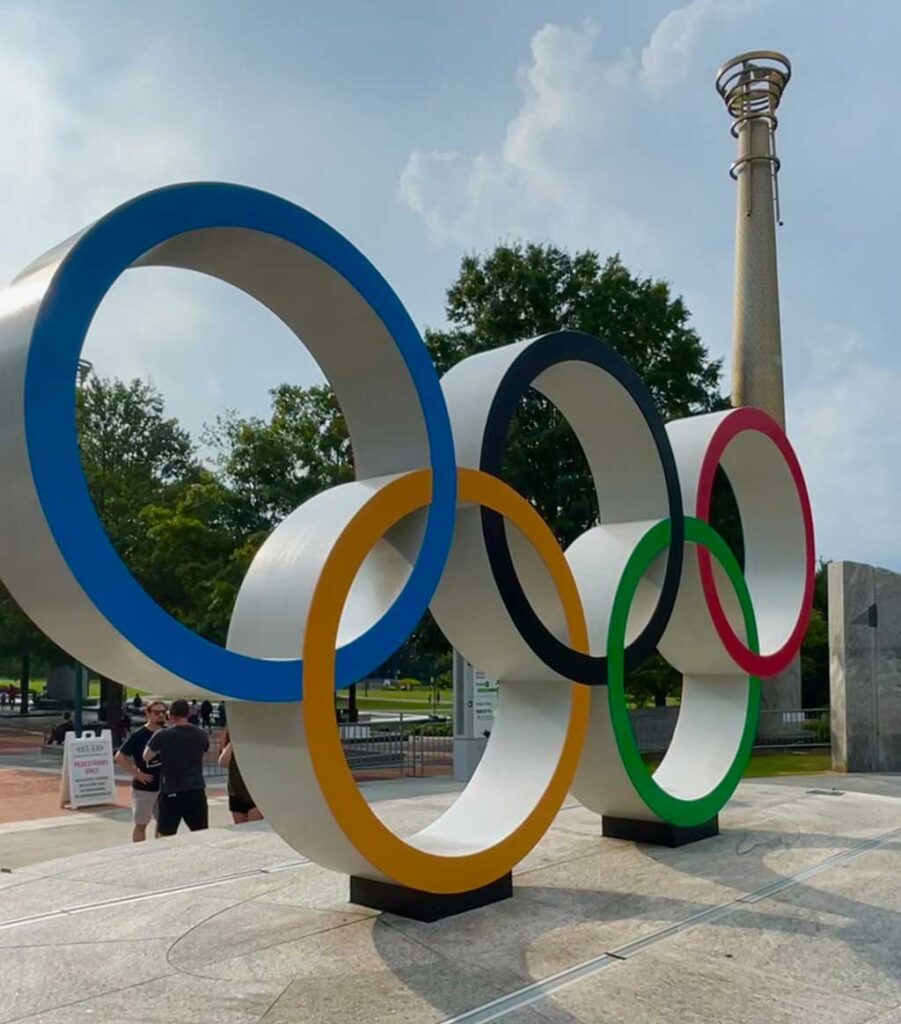
Who can forget the summer of 1996 when the Summer Olympics were held in Atlanta? While Centennial Olympic Park, so named because it marked the Olympics’ 100th anniversary, may have been the site of the tragic Olympic bombing that killed two people and inspired an award-winning feature film, it is today a lovely 22-acre green space that not only serves as Georgia’s legacy to all the good parts of the 1996 Olympics, but also is a wonderful place to meander and relax.
Enjoy the park’s playgrounds, gardens, and expansive lawns; explore the many landmarks that tell the history of the Olympic games and pay tribute to the athletes in Atlanta; take a ride in the SkyView Ferris wheel that soars 20 stories above the city; or attend one of the many outdoor events that happen in the park throughout the year.
One disappointment for me during my latest visit to Atlanta (late July 2021) is that the famous Fountain of Rings and the park’s other water sculptures were turned off, presumably due to issues related to COVID-19. This isn’t a reason not to visit the park – it still has plenty to offer – but just something to be aware of, and that could change at any time.
National Center for Civil and Human Rights
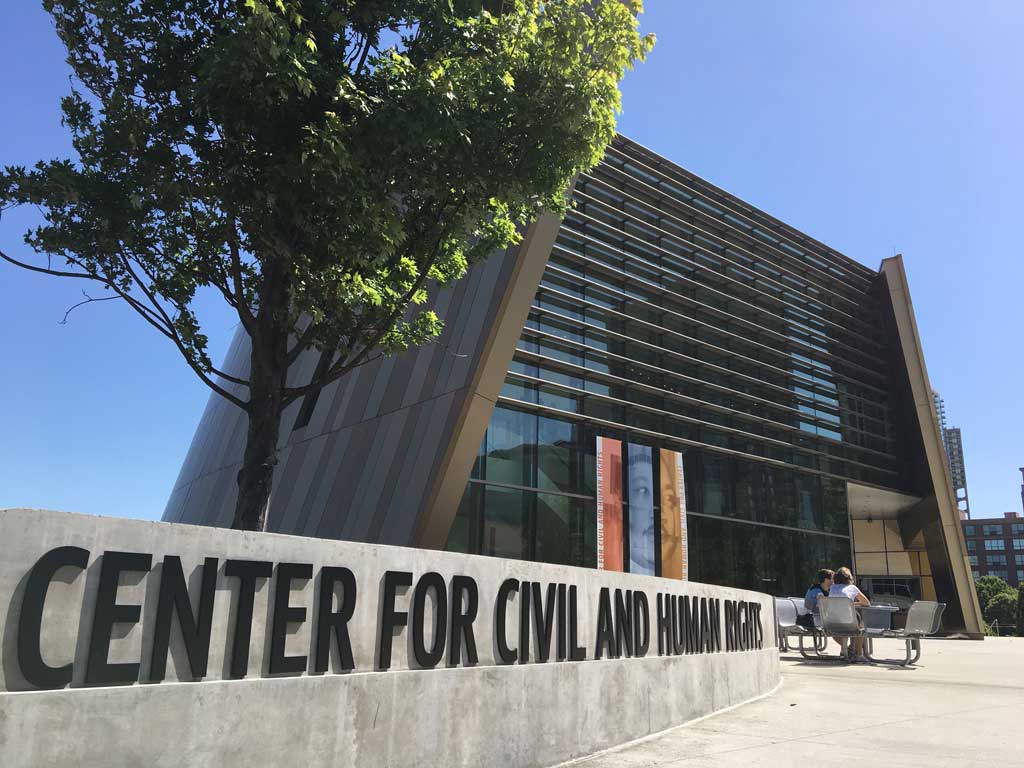
Adjacent to Centennial Park is a cluster of three popular and worthwhile attractions – World of Coca-Cola, the Georgia Aquarium, and the National Center for Civil and Human Rights. I haven’t been to the first two (though my husband and daughter did visit the World of Coca-Cola and liked it), but on my first trip to Atlanta I did go to the National Center for Civil and Human Rights and found it to be fascinating.
When I go to a city, I like to prioritize attractions that are unique to that place and/or representative of the “best of the best.†In the case of civil and human rights, this is definitely one of the best. What I loved about the center is that it not only explores the Civil Rights movement here in the United States, but also connects it to broader, more contemporary human rights challenges across the globe.

You’ll want a solid two hours to explore the center, which includes three permanent exhibits including an entire floor dedicated to Atlanta’s native son, Dr. Martin Luther King Jr., as well as rotating exhibits and galleries that focus on timely subjects of social justice. Visitors are invited as well to place themselves in the shoes of non-violent protestors in 1960 at the center’s lunch counter sit-in simulation.
Martin Luther King, Jr. National Historic Park
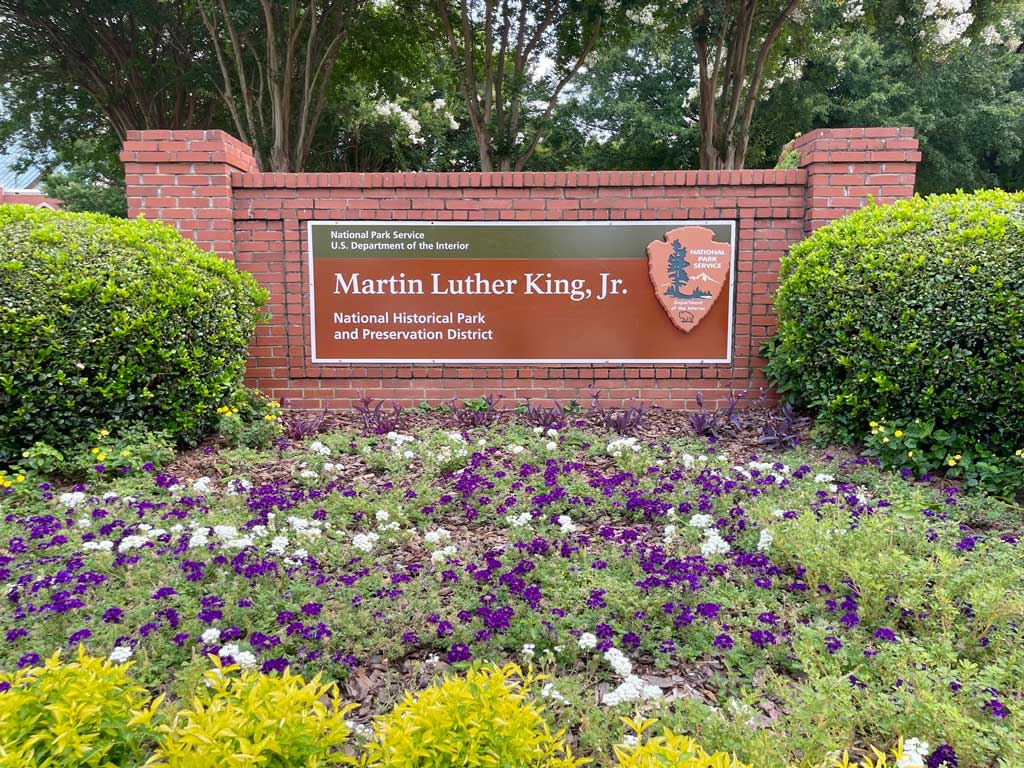
MLK National Historic Park, which I more or less stumbled on during my recent visit to Atlanta, is a must-see historic site that you cannot experience anywhere else in the country or the world.
Dr. King was born in Atlanta, and the National Historic Park dedicated to his legacy encompasses the neighborhood, known as “Sweet Auburn”, where he spent a happy, middle-class childhood before attending Morehouse College.
The home where the Civil Rights leader was born and raised is on Auburn Avenue, which in the first half of the 1900s was a thriving neighborhood of upwardly mobile Black families and thriving Black businesses. You’ll be able to see the lovely home where the Civil Rights leader was raised. Daily tours are normally available; however, at the time of this writing, it, along with all other buildings in the National Historic Park, were closed due to COVID.
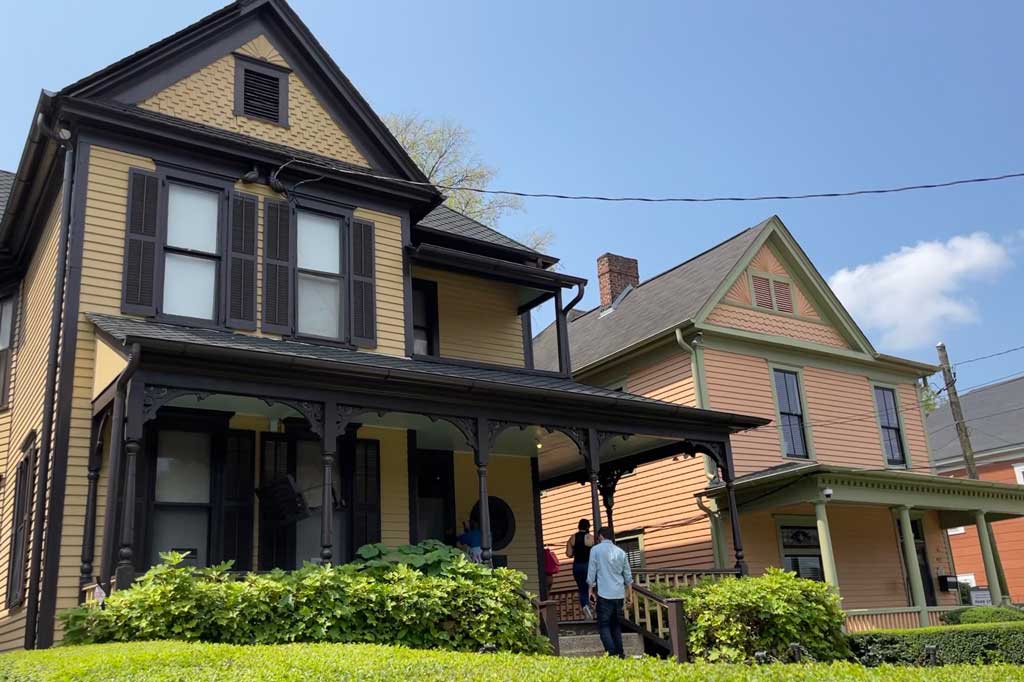
The park also includes Ebenezer Baptist Church, where Dr. King’s father, Martin Luther King, Sr., or “Daddy King”, as he was known, was pastor. MLK Jr. served as co-pastor with his father from 1960 until his death in 1968.
While you’re at the park, check out the Visitor’s Center; the “I Have a Dream†World Peace Rose Garden; and the King Center for Nonviolent Social Change, where you’ll be able to pay respects at the tomb of Dr. and Mrs. King. (Again, as of this writing, all park buildings were temporarily closed due to COVID, although even without going inside, there’s plenty to see.)
Coca-Cola Historical Locations
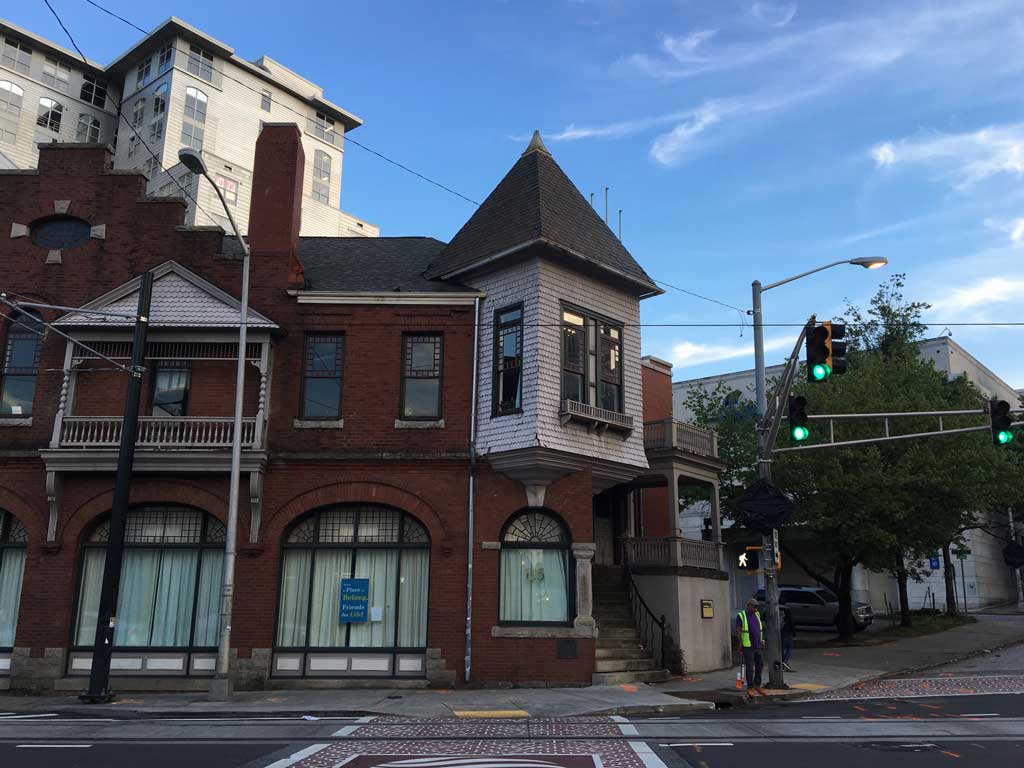
Less than a mile down the street from MLK National Historic Park is a piece of Coca-Cola history that is often overlooked and overshadowed by the World of Coca-Cola I mentioned earlier.
At 125 Edgewood Avenue is the “oldest surviving building associated with the early days” of the brand, according to the National Park Service. For one year between 1900 and 1901, the structure was the headquarters of the Dixie Coca-Cola Bottling Company, which would evolve into the Coca-Cola Bottling Company.
The property is an odd-shaped Victoria house and looks nothing like a bottling plant. It was designated as a National Historic Landmark in 1983, and you can catch a glimpse of it by car or foot. (You can’t go inside the building, so this a quick visit.)
History buffs might also be interested in driving by the site of the former Jacobs’ Pharmacy, where in 1886 the first glass of Coca-Cola was sold – a combination of carbonated water and Coke’s super-secret syrup developed by local pharmacist, John Pemberton, in his quest for a morphine replacement. In the pharmacy’s location today, at the southwest corner of Marietta Street and Peachtree, is Georgia State University’s School of Policy Studies.
Piedmont Park
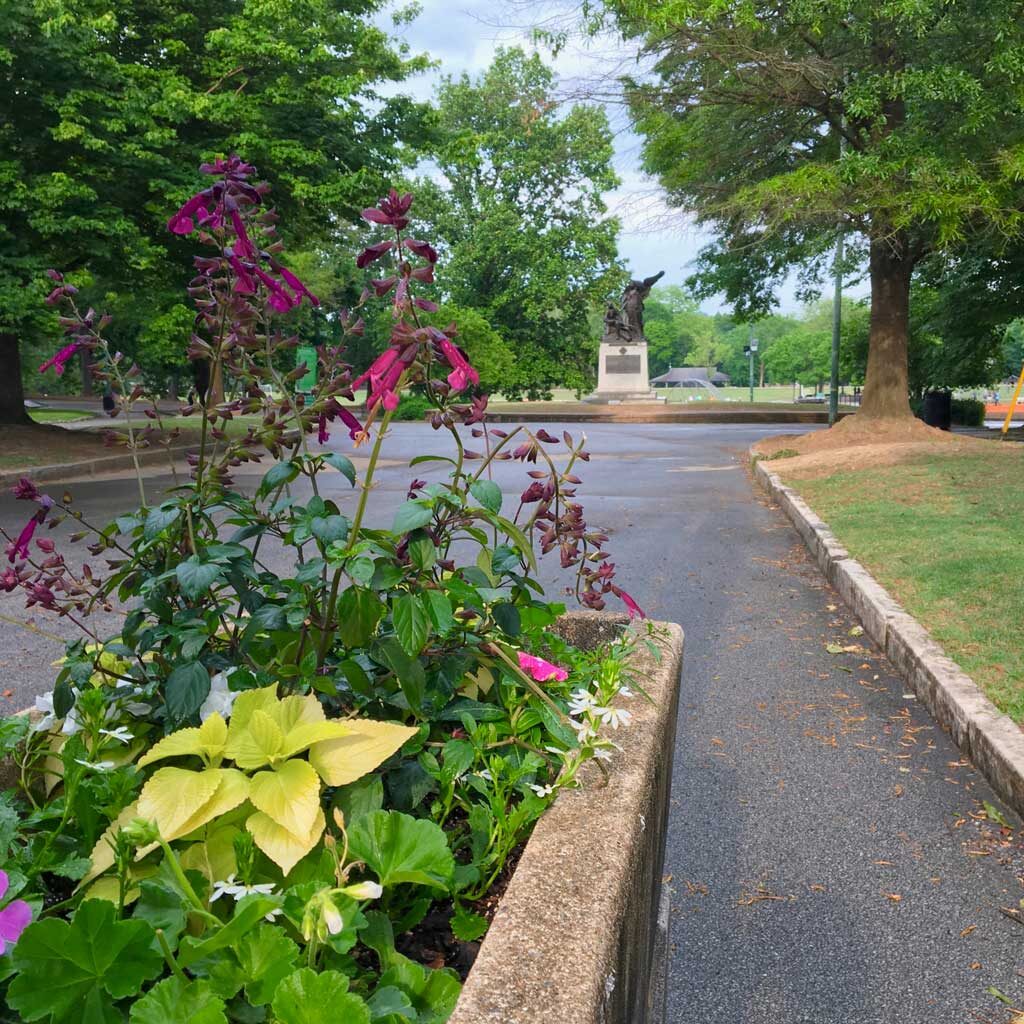
While Atlanta may lack the cooling breezes of a waterfront, the city has plentiful green space. Piedmont Park is Atlanta’s Central Park, with 185 acres of outdoor recreational bliss in Midtown.
Broad tree canopies provide welcome shade during hot summer days, while paved bike and pedestrian trails, soccer and softball fields, and sand volleyball courts host athletes and exercise seekers of all ages and abilities.
If you’re there on a Saturday, don’t miss the farmer’s market held 9 am to 1 pm, March through November featuring locally made jams, preserves, and artisan goods.
One of Atlanta’s great spring festivals, the Dogwood Festival, also takes place in Piedmont Park and is named for the native blooming trees that thrive there. Its Fine Artist Market is a great chance to see and buy unique sculptures, paintings, pottery, jewelry, and photography.
Atlanta Botanical Garden

If you have time, pair your stroll through Piedmont Park with a visit to the adjacent Atlanta Botanical Garden. Renowned plant collections, beautiful displays, and spectacular exhibitions make this botanical garden one of the loveliest places in the city to visit.
An urban oasis in the heart of Midtown, it includes 30 acres of outdoor gardens, an award-winning Children’s Garden, an enchanting Canopy Walk, and the picturesque Skyline Garden.
As part of the indoor collection, the Fuqua Orchid Center hosts the largest collection of orchid species on permanent display in the United States, showcasing more than 2,000 species of the world’s largest and most diverse plant family.
For now, due to COVID, you’ll want you’ll want to make a reservation in advance; it’s open Tuesday through Sunday, 9am to 9pm, with last entry at 8pm.
High Museum of Art
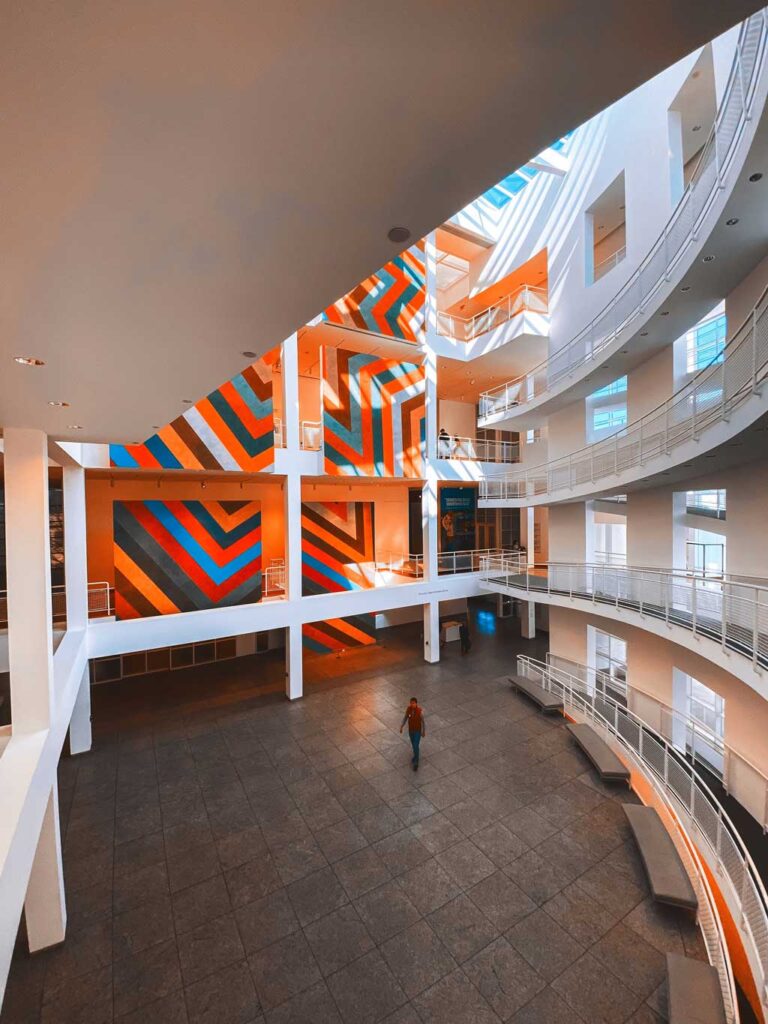
Time permitting, I always try to hit an art museum when I’m visiting a major city, especially if rain or ungodly hot weather make being outside challenging. Atlanta’s High Museum of Art is located in the city’s Midtown and is considered to be one of the nation’s leading art museums.
Boasting a celebrated collection of art ranging from classic to contemporary, including more than 17,000 pieces of American, European, and African decorative and folk art, plus photography, and architecture by the renowned Richard Meier and Renzo Piano, the High, as it is called, has something for everyone.
The High has a dynamic schedule of special exhibitions, and on the third Friday of every month, the public is invited to Friday Night Jazz, featuring music, drinks, and of course, art.
Plan on spending two to three hours exploring the High, which is open Tuesday through Sunday and closed on Mondays.
